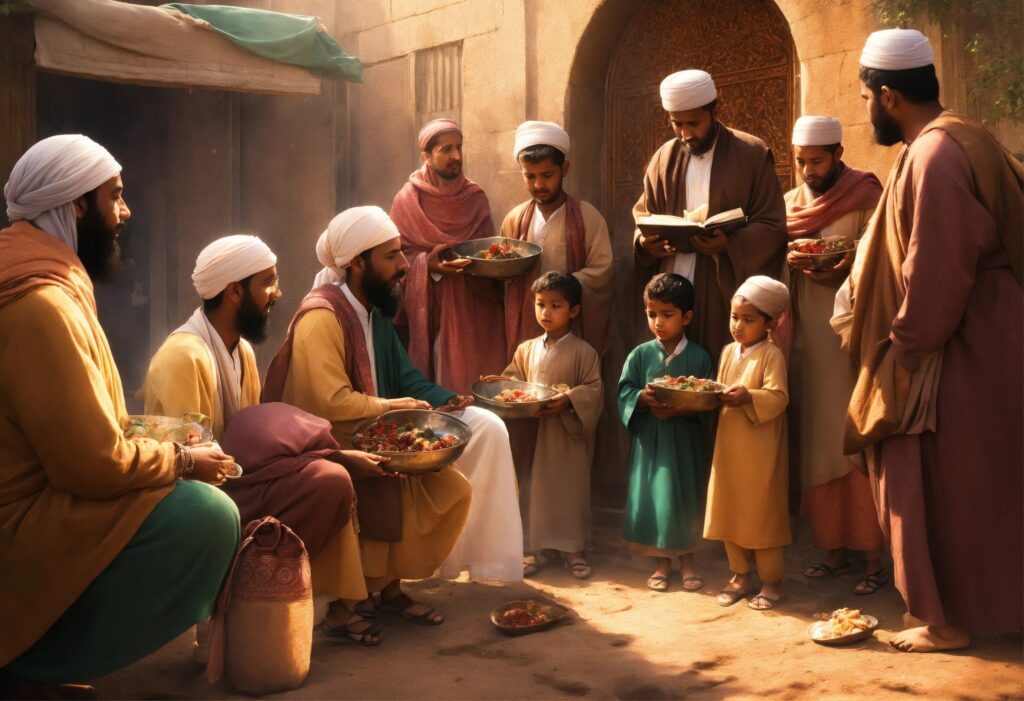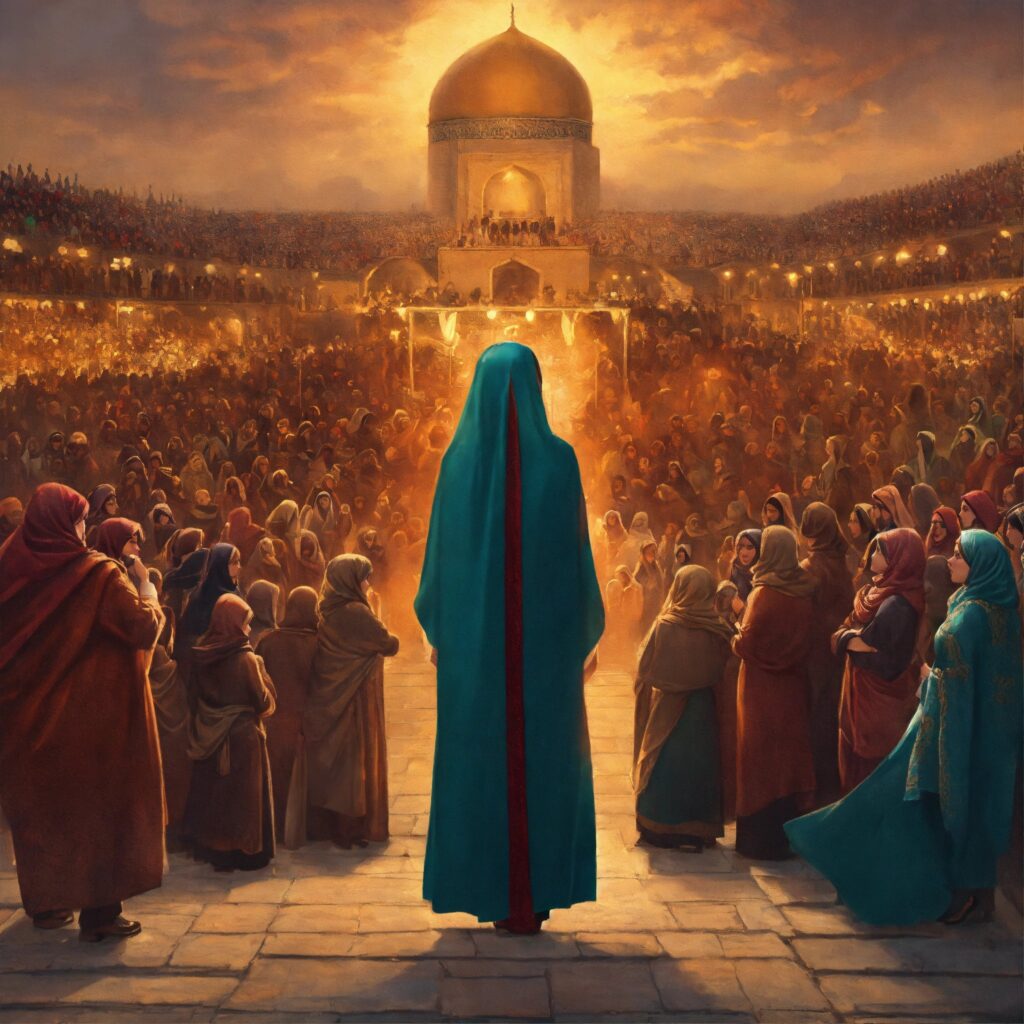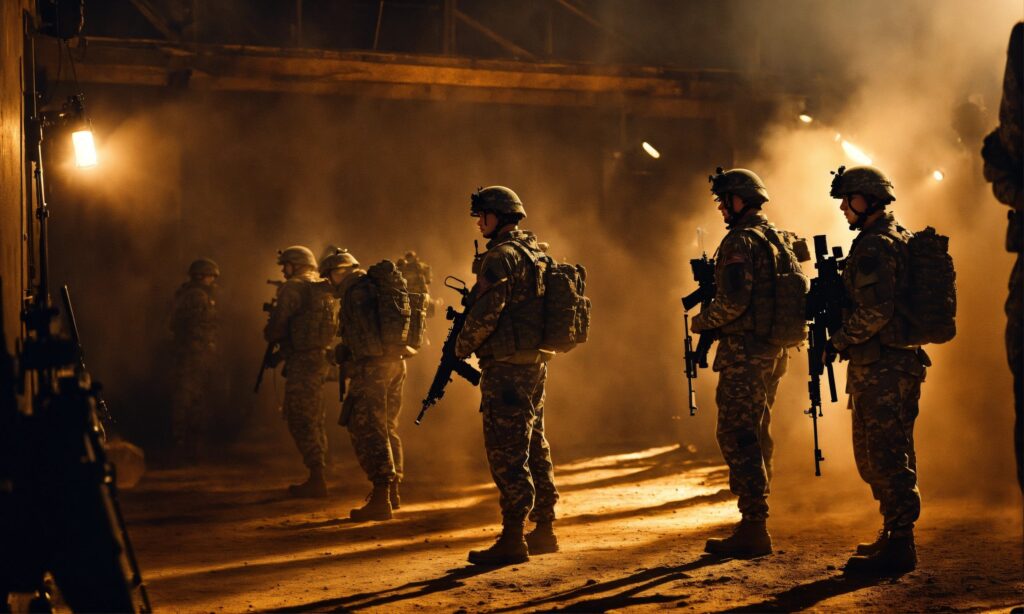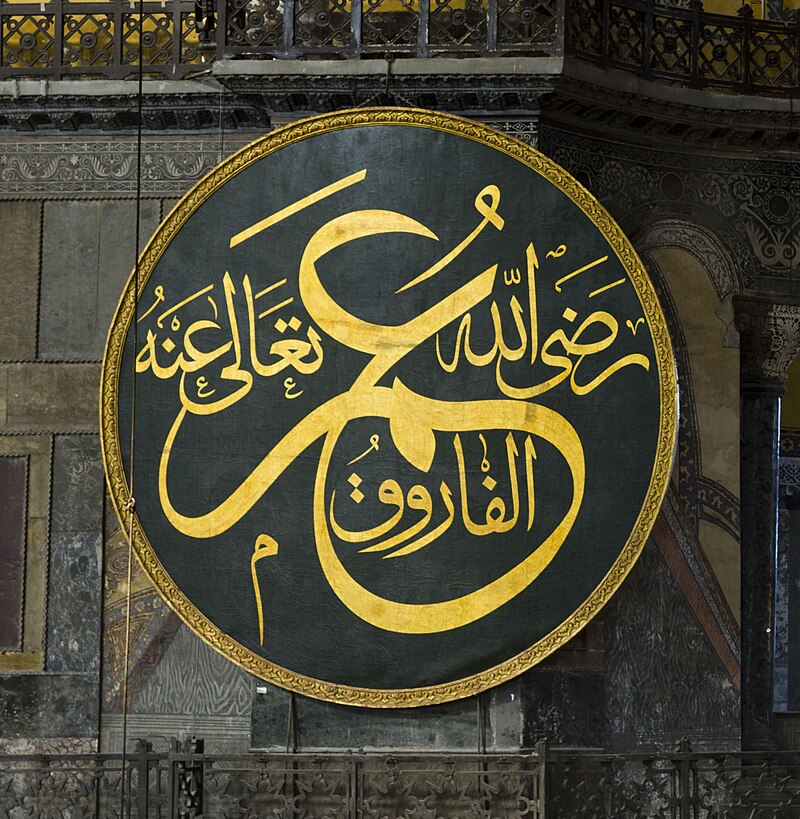The Courageous Leadership of Hazrat Umar: Stories of Bravery and WisdomHazrat Umar, one of the most prominent figures in Islamic history, is renowned for his exceptional leadership, bravery, and wisdom. His tenure as the second Caliph of the Muslim community was marked by significant reforms, just governance, and fearless decision-making. Through the stories of his courageous acts and profound wisdom, we can glean valuable lessons on leadership that remain relevant even today. Join us as we delve into the inspiring tales of Hazrat Umar’s life and explore how his legacy shapes our understanding of authentic leadership.
Welcome to [Ismail Wattoo] ‘s blog, where we delve into the inspiring stories of Hazrat Umar’s courageous leadership. With unparalleled bravery and profound wisdom, Hazrat Umar’s legacy offers valuable lessons in strength, justice, and humility. Join us as we explore tales that showcase his remarkable ability to lead with a firm hand and a compassionate heart, providing timeless insights into effective leadership.
Core Principles of Hazrat Umar’s Governance

Hazrat Umar’s governance was characterized by a rigid commitment to justice and fairness, ensuring all citizens, irrespective of status or religion, were treated equally. He instituted a transparent system of accountability, allowing even the highest officials to be scrutinized and questioned by the general public. His economic reforms promoted equitable resource distribution, notably establishing a welfare state to support the needy and poor. Additionally, Hazrat Umar valued consultation and collective decision-making, making policies through a council of advisors and community representatives.
From Adversary to Ally: Umar’s Conversion to Islam
Umar’s initial opposition to Islam was marked by his strong resistance and hostility towards Muslims in Mecca. Despite his adversarial stance, Umar experienced a profound internal transformation after reading verses from the Quran. His conversion was pivotal, leading to his emotional support and significant contributions to the early Muslim community. Umar’s journey from an adversary to a staunch ally of Islam exemplifies the powerful impact of faith and personal conviction.
The Journey from Merchant to Caliph: Key Milestones
Muhammad’s early life as a merchant in Mecca laid the foundation for his future leadership, honing his skills in negotiation and building relationships. His spiritual awakening and the revelation of the Quran marked the beginning of his prophetic mission, guiding him towards a life of profound religious significance. The migration to Medina, known as the Hijra, was a pivotal event that established the first Islamic state and provided a haven for his followers. His eventual consolidation of power and the unification of the Arabian Peninsula marked his remarkable transition from a humble merchant to the first Caliph, solidifying his legacy as a transformative leader in Islamic history.
From Adversary to Ally: Umar’s Conversion to Islam
Umar’s initial opposition to Islam was marked by his strong resistance and hostility towards Muslims in Mecca. Despite his adversarial stance, everything changed after he experienced a profound internal transformation triggered by reading verses from the Quran. This pivotal moment led to his emotional support and significant contributions to the early Muslim community. Umar’s journey from an adversary to a staunch ally of Islam exemplifies the powerful impact of faith and personal conviction.
Hazrat Umar’s Early Life and Rise to Leadership
Hazrat Umar was born in Mecca into the powerful and respected Banu Adi clan of the Quraish tribe. Initially, he opposed the teachings of Prophet Muhammad, but after a profound personal transformation, he converted to Islam. His strong character and remarkable administrative skills were pivotal in shaping the early Muslim community’s structure and governance. Recognized for his leadership qualities, Hazrat Umar rose to become the second Caliph following the death of Abu Bakr, cementing his legacy as a key figure in Islamic history.
The Battle of Yarmouk: A Turning Point in Islamic History
The Battle of Yarmouk, fought in 636 AD, was a monumental clash that saw the Rashidun Caliphate triumph decisively over the Byzantine Empire, reshaping the trajectory of Islamic and global history. This historic encounter highlighted the exceptional military expertise of the Muslim forces, led by the renowned commander Khalid ibn al-Walid, famously known as the ‘Sword of Allah’. The victory at Yarmouk catalyzed the swift expansion of Islamic influence throughout the Levant, including the key cities of Damascus and Jerusalem. Furthermore, this pivotal battle underscored the unity and strategic brilliance of the early Muslim community, firmly establishing their dominance in the region and paving the way for subsequent conquests.
Conquests and Campaigns: Expanding the Islamic State
Under the Rashidun Caliphs, the early Islamic conquests rapidly expanded into the Byzantine and Sassanian empires, significantly broadening the Islamic State’s influence. This expansion was driven by strategic military campaigns and alliances, with leaders like Khalid ibn al-Walid executing brilliant tactics. The Umayyad dynasty continued this momentum, extending Islamic rule to the far reaches of Spain and India and spreading Islamic culture and administration. These conquests brought new territories under Islamic control and facilitated cultural and economic exchanges that profoundly shaped the medieval Islamic world.
The Battle of Yarmouk: A Turning Point in Islamic History
The Battle of Yarmouk fought in 636 AD, marked a decisive victory for the Rashidun Caliphate over the Byzantine Empire, significantly altering the course of Islamic and world history. This historic battle showcased the military prowess of the Muslim forces under the command of Khalid ibn al-Walid, earning him the nickname “Sword of Allah.” The victory at Yarmouk paved the way for the rapid expansion of Islamic territory into the Levant, including the critical cities of Damascus and Jerusalem. Additionally, it demonstrated the unity and strategic brilliance of the early Muslim community, solidifying their presence in the region and setting the stage for future conquests.
Hazrat Umar’s Early Life and Rise to Leadership

Hazrat Umar was born in Mecca into the powerful and respected Banu Adi clan of the Quraish tribe. Initially a staunch opponent of Prophet Muhammad’s teachings, he underwent a profound personal transformation that led him to embrace Islam. His strong character and exceptional administrative skills were pivotal in shaping the early Muslim community’s structure and governance. Recognized for his leadership qualities, Hazrat Umar became the second Caliph following the death of Abu Bakr, significantly contributing to the expansion and consolidation of the Islamic state.
Justice System Overhaul
Implementing comprehensive reforms to address systemic biases within the justice system is crucial for fostering a fair and equitable society. Enhancing transparency and accountability mechanisms for law enforcement agencies ensures that those in power are held to higher standards of conduct. Expanding access to legal resources and representation for underserved communities helps bridge gaps in justice, giving everyone an equal voice. Additionally, promoting restorative justice practices as alternatives to traditional punitive measures encourages healing and reconciliation rather than merely inflicting punishment. Together, these efforts can create a more just and empathetic legal framework.
Economic Policies and Public Welfare
Economic policies are crucial in shaping public welfare by influencing employment rates and income distribution. Effective financial policies can ensure access to essential services like healthcare and education, improving overall quality of life. Public welfare programs funded by these policies can reduce poverty and support vulnerable populations. Balancing fiscal policies and social welfare programs is essential to achieve sustainable and inclusive economic growth, ensuring that no one is left behind in the pursuit of prosperity.
Military Exploits and Strategic Brilliance
Military exploits often showcase commanders’ tactical prowess and troops’ discipline. Strategic brilliance is demonstrated through innovative battle plans and the effective use of resources. Historical military leaders who achieved great feats are studied for their strategic acumen and leadership skills. Understanding military exploits provides insights into the evolution of warfare and the importance of strategy in achieving victory.
Conquests and Expansions
The conquests and expansions of ancient empires often led to the spread of culture, religion, and technological advancements as victorious forces assimilated conquered peoples and established new administrative systems. These expansions allowed empires to control key trade routes and resources, significantly boosting their economic power. Moreover, the strategic and tactical innovations developed during these military conquests frequently set the standard for future campaigns, showcasing the lasting impact of these historical events.
Innovative Military Tactics

Integrating advanced drone technology for surveillance and targeted strikes has revolutionized modern warfare, offering unprecedented precision and intelligence. Using cyber warfare to disrupt enemy communications and systems has also become critical to military strategy, undermining adversaries’ abilities without traditional combat. Additionally, artificial intelligence in decision-making processes enhances battlefield efficiency and reduces human error, allowing for more accurate and swift responses. Adapting guerrilla warfare techniques to urban environments has proven highly effective in asymmetrical combat scenarios, leveraging the knowledge of complex terrain to outmanoeuvre conventional forces.
Administrative Reforms and Governance
Streamlining bureaucratic processes can significantly enhance efficiency and reduce corruption in public administration. Implementing transparent policies and digital governance tools further improves accountability and citizen engagement. Regular training and development programs for public servants foster a more competent and motivated workforce. Encouraging public-private partnerships can drive innovation and improve service delivery in government operations.
Early Influences and Mentors
Early influences and mentors provide the foundational knowledge and inspiration that shape an individual’s career path and personal development. Mentors offer invaluable guidance and support, sharing their experiences and wisdom to help mentees navigate challenges and seize opportunities. These early influences can be seen in the development of skills, work ethic, and values that individuals carry throughout their lives. Building solid relationships with mentors can lead to lifelong connections and networks that open doors to new possibilities and collaborations.
Initial Acts of Bravery
Overcoming the fear of the unknown and taking the first step in a challenging situation is a significant bravery. Standing up for one’s beliefs, even in the face of potential backlash from peers or authority figures, demonstrates a courageous commitment to personal values. Rescuing someone in immediate danger without regard for personal safety exemplifies selfless bravery in critical moments. Lastly, speaking out against injustice or unfair treatment, especially when others remain silent, is a powerful bravery that can inspire change.
Military Exploits and Strategic Brilliance
Military exploits often showcase commanders’ tactical prowess and troops’ discipline, with strategic brilliance demonstrated through innovative battle plans and the effective use of resources. Historical military leaders who achieved great feats are studied for their strategic acumen and leadership skills. Understanding these exploits provides valuable insights into the evolution of warfare and underscores the importance of strategy in achieving victory.
Enduring Influence: Umar’s Contributions to Islamic Civilization
Umar implemented administrative reforms that established efficient governance across the rapidly expanding Islamic empire, creating a solid and organized state. His introduction of social welfare systems, including pensions and stipends, notably improved the quality of life for many citizens, making welfare accessible to all. Through strategic military campaigns and significant conquests, Umar vastly expanded Islamic territories, strengthening its influence and control. Moreover, he promoted justice and equality by establishing judicial frameworks that ensured fair treatment under Islamic law, fostering a sense of integrity and responsibility within the community.
Lessons for Modern Leaders: Timeless Wisdom from Umar’s Life
Umar’s life teaches modern leaders the importance of justice and fairness in governance, ensuring everyone is treated equally. He exemplified the value of humility and accountability, demonstrating that authentic leadership involves admitting and learning from mistakes. Umar’s emphasis on community welfare highlights how leaders should prioritize the well-being of their people and work towards the common good. His strategic vision and ability to make tough decisions in the face of adversity guide leaders to remain steadfast and adaptable in challenging times.
Enduring Influence: Umar’s Contributions to Islamic Civilization
Umar implemented administrative reforms that established efficient governance across the rapidly expanding Islamic empire. He introduced social welfare systems, including pensions and stipends, which improved the quality of life for many citizens. Umar’s military strategies and conquests significantly expanded Islamic territories, solidifying its influence and control. He promoted justice and equality by establishing judicial frameworks that ensured fair treatment under Islamic law.
Lessons for Modern Leaders: Timeless Wisdom from Umar’s Life
Umar’s life teaches modern leaders the importance of justice and fairness in governance, ensuring everyone is treated equally. He exemplified the value of humility and accountability, showing that authentic leadership involves admitting mistakes and learning from them. Umar’s emphasis on community welfare highlights how leaders should prioritize the well-being of their people and work towards the common good. His strategic vision and ability to make tough decisions in the face of adversity guide leaders to remain steadfast and adaptable in challenging times.
Strategic Military Campaigns
Strategic military campaigns involve the meticulous planning and execution of operations to achieve specific objectives. These campaigns often demand the coordination of various military branches and the effective utilization of resources and intelligence. Historical examples like the Normandy Invasion and the Desert Storm operation showcase the success of well-planned strategies. Effective strategic military campaigns are marked by clear goals, adaptable tactics, and the ability to respond to evolving battlefield conditions.
Administrative Reforms and Governance
Streamlining bureaucratic processes can significantly enhance efficiency and reduce corruption in public administration. Implementing transparent policies and digital governance tools can improve accountability and citizen engagement. Regular training and development programs for public servants can foster a more competent and motivated workforce. Encouraging public-private partnerships can drive innovation and better service delivery in government operations.
Early Life and Formation of Leadership Traits
Growing up in a diverse community helped shape their inclusive leadership style, teaching them to value different perspectives and cultures. Early exposure to challenging situations cultivated resilience and problem-solving skills, enabling them to navigate complex issues confidently. Mentorship from influential figures during adolescence inspired a commitment to ethical leadership, instilling a strong sense of integrity and responsibility. Additionally, participation in team sports and group activities fostered teamwork and communication abilities, essential traits for effective and collaborative leadership.
Strategic Military Campaigns
Strategic military campaigns involve the careful planning and execution of operations to achieve specific objectives. They require the coordination of various military branches and the effective use of resources and intelligence. Historical examples like the Normandy Invasion and the Desert Storm operation showcase the success of well-planned strategies. Effective campaigns are characterized by clear goals, flexible tactics, and the ability to adapt to changing circumstances on the battlefield.
Early Life and Formation of Leadership Traits
Growing up in a diverse community helped shape their inclusive leadership style, as it taught them to appreciate different perspectives and cultures. Early exposure to challenging situations cultivated resilience and problem-solving skills, enabling them to navigate complex issues confidently. Mentorship from influential figures during adolescence inspired a commitment to ethical leadership, instilling a strong sense of integrity and responsibility. Additionally, participation in team sports and group activities fostered teamwork and communication abilities, essential traits for effective and collaborative leadership.
Legacy and Impact on the Islamic World
The legacy of early Islamic scholars profoundly influenced the fields of science, mathematics, and medicine, laying the groundwork for numerous advancements. The spread of Islamic culture and language fostered the development of art, architecture, and literature, enriching the cultural tapestry across the Islamic world. Islamic teachings and principles significantly shaped many Muslim-majority countries’ legal and ethical frameworks, promoting justice and societal well-being. The artistic and intellectual exchange during the Islamic Golden Age impacted the Islamic world and the global community, driving progress and fostering a shared heritage of knowledge and innovation.
Frequently Asked Questions
Conclusion
In conclusion, the courageous leadership of Hazrat Umar exemplifies an extraordinary blend of bravery and wisdom, which has left an indelible mark on history. Hazrat Umar’s life is a testament to the transformative power of faith and leadership from his early days as a formidable adversary of Islam to his eventual conversion, followed by his rise from a merchant to the revered Caliph.
His strategic military campaigns, particularly the decisive Battle of Yarmouk, showcased his tactical brilliance and expanded the Islamic state. At the same time, his administrative reforms revolutionized governance, emphasizing justice, economic welfare, and transparent policies. Hazrat Umar’s contributions to the socio-political fabric and his rigorous justice system overhaul set a benchmark for equity and fairness, which modern leaders can still learn from. His economic policies fostered public welfare, showing a keen understanding of statecraft and governance. Through innovative military tactics and conquests, he enlarged the Muslim empire and ensured its stability and prosperity. The enduring influence of Hazrat Umar’s leadership continues to inspire, offering timeless wisdom for contemporary leaders.
His ability to make tough decisions, his steadfastness in adversity, and his commitment to justice and public welfare reflect the core attributes of effective leadership. As we reflect on his legacy, it becomes clear that his principles are as relevant today as they were in his time, providing a guiding light for those seeking to lead with courage and wisdom in our complex world. Hazrat Umar’s life story is not just a historical account but a powerful narrative of resilience, integrity, and visionary leadership.
For More information about Hazrat Umar Click Here

